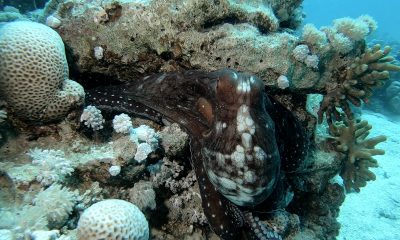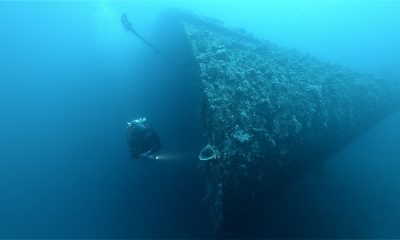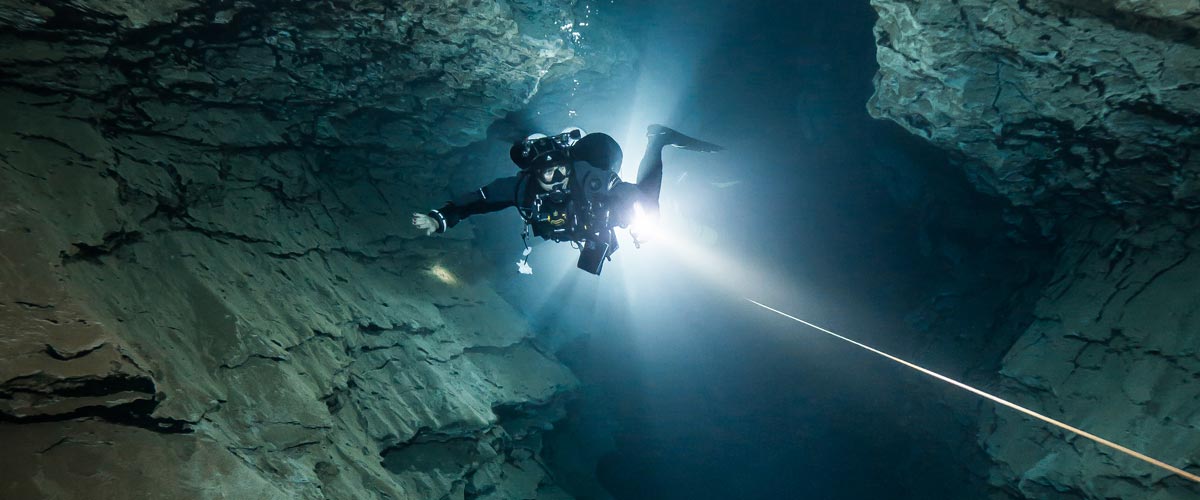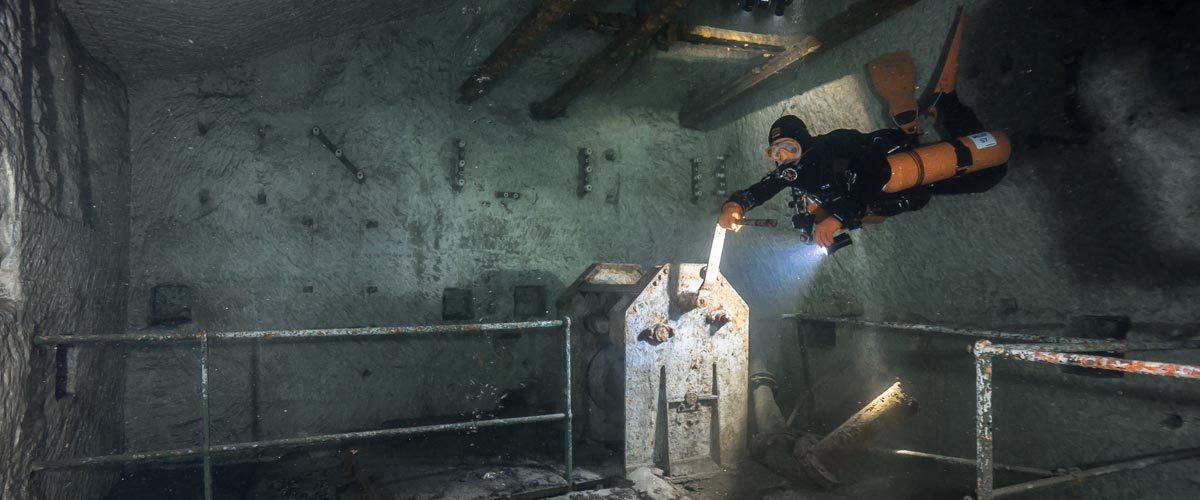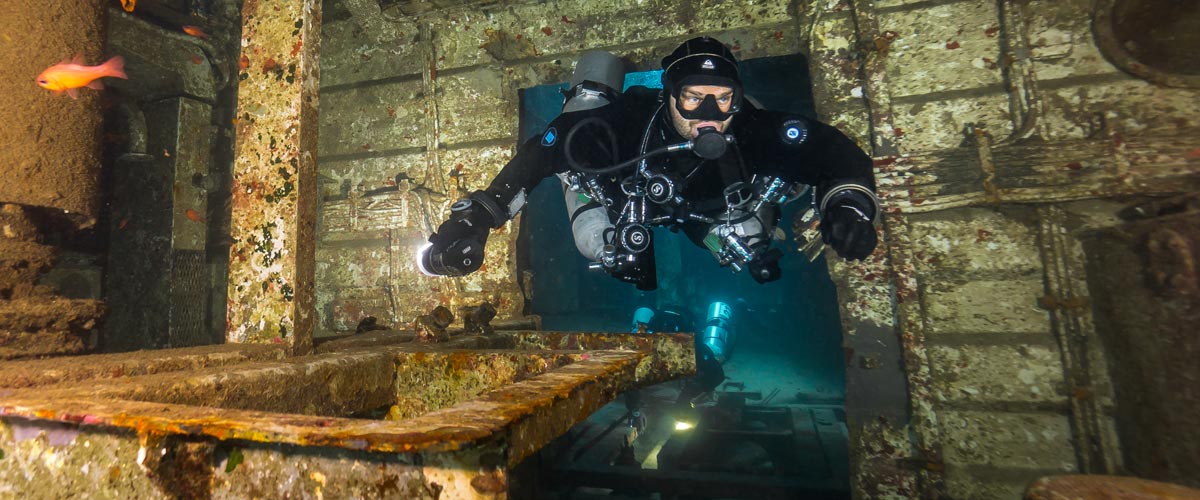Dive Training Blogs
Bikini Biologist Becomes PADI Instructor After Completing IDC in Roatan
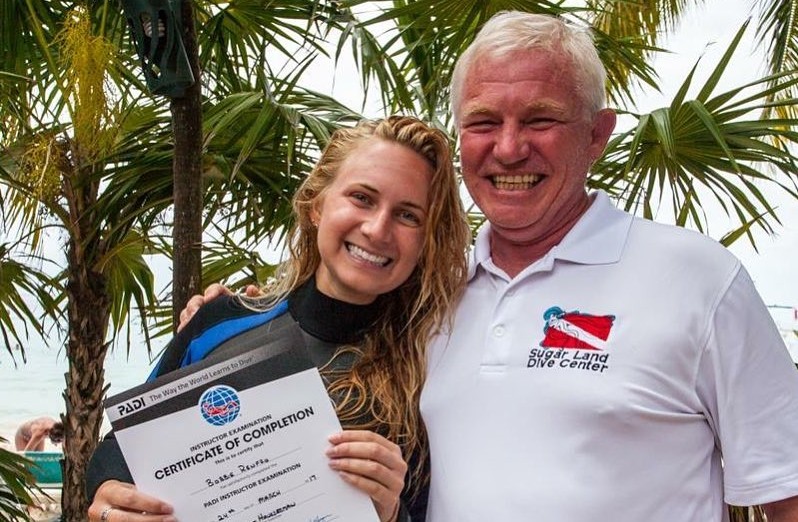
Earlier this year, Bobbie Renfro (also known as the “Bikini Biologist” in social media circles) completed her PADI IDC at Subway Watersports on Roatan. Her insights and experiences during her time on Roatan helped her complete the PADI Instructor Examination in March. Here is “the Bikini Biologist’s” inside look at her experience.
Are you interested in taking your SCUBA diving to a professional level?
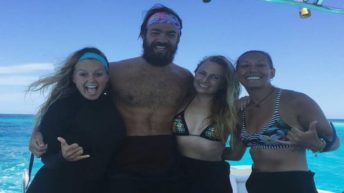 For many people this step up the dive-training ladder will open up a world of new job and travel opportunities. For me in particular, I needed to become a Professional Association of Diving Instructors (PADI) instructor to help further my career in marine biology. I started looking at Dive Master (DM) programs in my home state of Texas, but I found that dive shops had rather undefined answers to the question, “How much money and how much time will my DM internship require?” Because of this, I started looking at internship programs in the Caribbean that had set timeframes and total costs for training.
For many people this step up the dive-training ladder will open up a world of new job and travel opportunities. For me in particular, I needed to become a Professional Association of Diving Instructors (PADI) instructor to help further my career in marine biology. I started looking at Dive Master (DM) programs in my home state of Texas, but I found that dive shops had rather undefined answers to the question, “How much money and how much time will my DM internship require?” Because of this, I started looking at internship programs in the Caribbean that had set timeframes and total costs for training.
I chose Subway Watersports on the island of Roatán, Honduras. They require an application for admittance into their program, as spots per month are limited. Once admitted for my DM, I was able to sign up for back-to-back programs to complete my Dive Master internship and Instructor Development Course (IDC). PADI holds frequent Instructor Examinations on Roatán making it fairly easy to find an IDC that fits your schedule.
 My experience working with Subway Watersports was phenomenal. The shop has two locations, a main shop at Turquoise Bay Resort on the north side of the island and a second shop on the south side of the island. Their level of access to dive sites around the island allowed me to dive the north, west and south sides of the island as well as one daytrip to a small, rarely-visited caye off the east end of the island. Interns I’ve met from other DM programs did not get to dive the same wide variety of sites. Between all those great dives, the shop does keep you working hard carrying tanks, learning dive theory or practicing skills pretty much sun up to sun down six days a week. Even with all the time spent working at the shop, our intern group still jumped at chances to come in on our days off when Subway would schedule us exciting extras like shark dives and dives on the Odyssey wreck.
My experience working with Subway Watersports was phenomenal. The shop has two locations, a main shop at Turquoise Bay Resort on the north side of the island and a second shop on the south side of the island. Their level of access to dive sites around the island allowed me to dive the north, west and south sides of the island as well as one daytrip to a small, rarely-visited caye off the east end of the island. Interns I’ve met from other DM programs did not get to dive the same wide variety of sites. Between all those great dives, the shop does keep you working hard carrying tanks, learning dive theory or practicing skills pretty much sun up to sun down six days a week. Even with all the time spent working at the shop, our intern group still jumped at chances to come in on our days off when Subway would schedule us exciting extras like shark dives and dives on the Odyssey wreck.
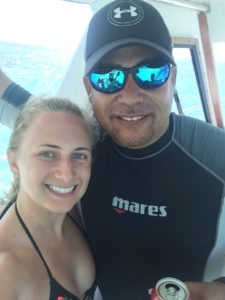 The staff really felt like family while I was there. Everyone for the most part speaks English, but they were encouraging when I wanted to practice my Spanish. The shop manager Daren Ebanks goes above and beyond to keep staff, interns and hotel guests happy even in the face of inevitable diving dilemmas like bad weather. Daren and your instructors will prioritize your timeline to make sure that you meet all the requirements to complete your DM or IDC in the planned timespan of your program. Subway Watersports employs a large staff of local dive masters and boat captains, but also has quite a diverse faculty of dive instructors for their internship program. My DM instructors were Liam Shearer from New Zealand and Arturo Corvino from Argentina. I was beyond impressed with their extensive backgrounds in dive instruction. The PADI educational system is largely based on learning through experience, whether it’s your own dive experiences or those of others. Having two instructors with very different cultural and diving backgrounds is a huge bonus when studying under the PADI system. Liam and Arturo kept us laughing and engaged while maintaining the importance of taking our training seriously.
The staff really felt like family while I was there. Everyone for the most part speaks English, but they were encouraging when I wanted to practice my Spanish. The shop manager Daren Ebanks goes above and beyond to keep staff, interns and hotel guests happy even in the face of inevitable diving dilemmas like bad weather. Daren and your instructors will prioritize your timeline to make sure that you meet all the requirements to complete your DM or IDC in the planned timespan of your program. Subway Watersports employs a large staff of local dive masters and boat captains, but also has quite a diverse faculty of dive instructors for their internship program. My DM instructors were Liam Shearer from New Zealand and Arturo Corvino from Argentina. I was beyond impressed with their extensive backgrounds in dive instruction. The PADI educational system is largely based on learning through experience, whether it’s your own dive experiences or those of others. Having two instructors with very different cultural and diving backgrounds is a huge bonus when studying under the PADI system. Liam and Arturo kept us laughing and engaged while maintaining the importance of taking our training seriously.
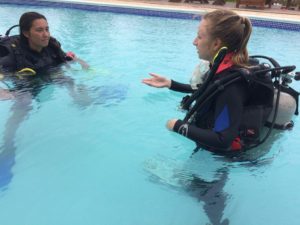 After completing my DM, I transitioned to the IDC program led by PADI Course Director Phillip Hetherington and IDC Staff Instructor Kendal Larson. I do not believe I could have found two better people than Phil and Kendal to show me how to be a successful PADI Professional. Fair warning, PADI IDC entails some exhausting days of back-to-back lectures on physics, physiology, dive theory, PADI standards… the list goes on. This is professional level education and the workload reflects the extent of knowledge and expertise needed to be a successful dive instructor. Phil and Kendal managed to keep a room full of tired divers engaged and learning even through the stickiest of physics problems. Two weeks flew by as they prepared us for the Instructor Examination with pool skills demonstrations, classroom lectures and open water sessions. After four years of college and two years of graduate school I have taken a lot of exams, but I have never felt more prepared for a test than I was for the PADI Instructor Exam thanks to the level of quality SCUBA instruction that Phil and Kendal instilled in our IDC cohort.
After completing my DM, I transitioned to the IDC program led by PADI Course Director Phillip Hetherington and IDC Staff Instructor Kendal Larson. I do not believe I could have found two better people than Phil and Kendal to show me how to be a successful PADI Professional. Fair warning, PADI IDC entails some exhausting days of back-to-back lectures on physics, physiology, dive theory, PADI standards… the list goes on. This is professional level education and the workload reflects the extent of knowledge and expertise needed to be a successful dive instructor. Phil and Kendal managed to keep a room full of tired divers engaged and learning even through the stickiest of physics problems. Two weeks flew by as they prepared us for the Instructor Examination with pool skills demonstrations, classroom lectures and open water sessions. After four years of college and two years of graduate school I have taken a lot of exams, but I have never felt more prepared for a test than I was for the PADI Instructor Exam thanks to the level of quality SCUBA instruction that Phil and Kendal instilled in our IDC cohort.
I am now a PADI Master SCUBA Diver Trainer (Phil made time for us to get in five specialty course certifications). My decision to train with Subway Watersports has already paid off. Since they were able to conduct my DM internship and IDC in such a timely and efficient manner I was able to accept an offer for the job of a lifetime instructing university marine science and diving courses this summer for Sea|mester, a college study abroad program affiliated with University of South Florida. I strongly encourage you to consider Subway Watersports for your dive professional training.
If you have any further questions about my experiences with Subway Watersports or becoming a PADI Professional please email me at thebikinibiologist@gmail.com.
Find out more about Subway Watersports at www.subwaywatersports.com.
Source: www.divenewswire.com
Blogs
Intro to Tech: What is it about?
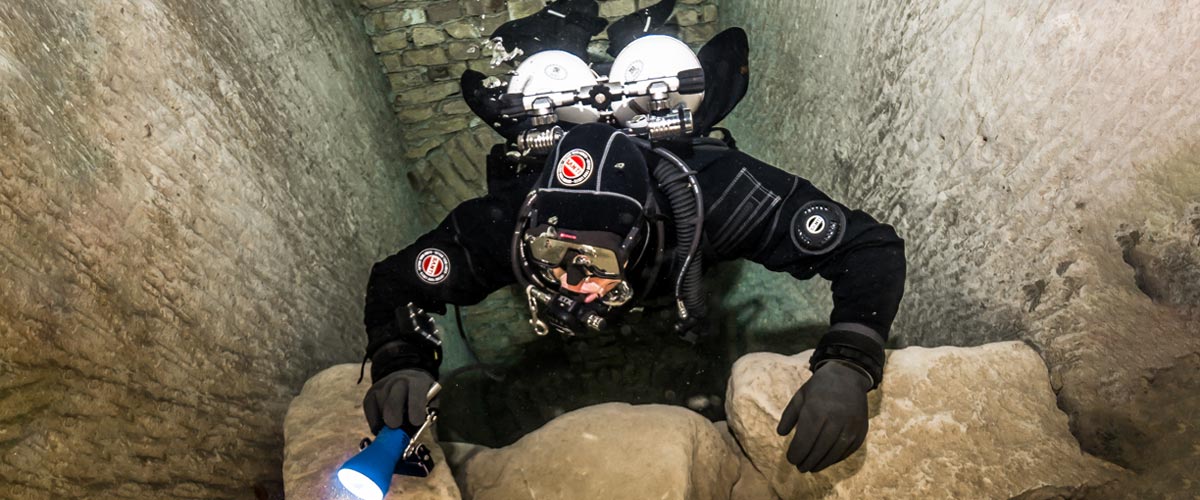
Article by José Pablo Mir
Pictures by Cezary Abramowski
The world of technical diving is exciting. It opens the door to new sites, depths, and bottom times. More importantly, it opens our minds to a new way of planning, facing, and experiencing dives, even those not purely technical.
Becoming a technical diver is a process, and like in other aspects of life, we should find the proper entry point that suits us best based on our knowledge and experience. The Introduction to Technical Diving course from TDI -the world’s largest and most recognized technical diving teaching organization- is the best option for divers who have yet to gain experience in the fundamental aspects of this new practice. The course’s content and its embrace of new techniques and technologies make it possible to acquire a solid foundation to learn and gain experience in this practice properly.
Becoming a technical diver is not something that happens overnight, whether deciding to become one or receiving a certification card stating we are now technical divers. It is a slow process extending farther away than any introductory course. It requires effort and dedication. But it will bring us satisfaction from day one -or two.
It is a matter of mentality
First, we must understand and accept that technical diving, involving greater depths, longer bottom times, exotic gases, virtual or real ceilings, and more, comes with higher levels of risk than the sport diving we have been practicing until now.
Although this discussion usually starts with a warning about risks, as I’ve done in the previous sentence, our practice is not a game of chance.
Technical diving is a rational activity that requires maturity and good judgment, and we will put everything into ensuring that each dive is a successful one -meaning we return from it safe and sound. With this understanding, we will strive to establish a mental attitude more aligned with our practice and its realities.
This new “technical diver” mindset we will develop will lead us to be more cautious in our executions, more analytical in our plans, more rational in our strategies, and more detailed in our procedures.
Experience will keep teaching us to know ourselves better, to keep our anxiety and other emotions under control, and to manage our impulses. Over time, our senses will sharpen, and we will be more attentive to the particulars of the situation we find ourselves in.
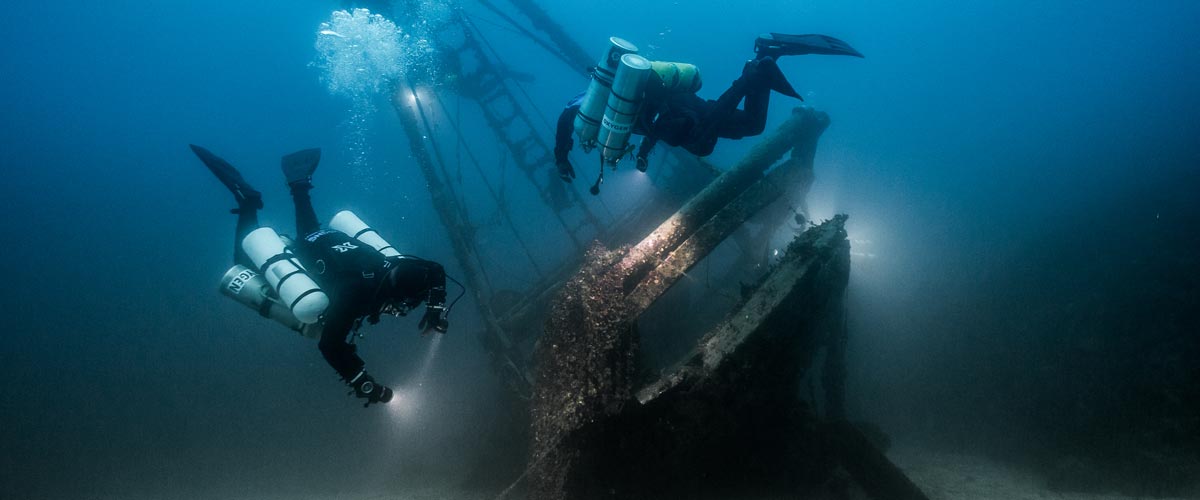
Strategies and procedures
Our strategies, those broad guiding lines tracing the path to follow, from how to approach planning to where, with what, and how we are willing to get there, will be more specific and more practical. Not because they magically become so, but because we will consciously and deliberately frame them that way.
We will establish clear, concise, and realistic procedures. Not only for the undesirable situations that may present themselves but also for those that are part of our dive objectives.
Even though, as technical divers, we often use equipment different from what we were previously accustomed to, it is essential to note that the gear does not make the diver. In a way, we could consider such equipment as the necessary tools to implement what our goal seeks to achieve, according to our strategies and procedures.
Technique plays an important role
We must put our greatest effort into learning and perfecting the different techniques we will be acquiring. Buoyancy, trim, propulsion, cylinder handling, deploying DSMBs and lift bags, valve drills, and more are essential skills we must begin to master to progress in our art. What we cannot do, when we need to do it, can harm us.
Our techniques must be effective and achieve the purpose for which they were devised. But they must also be efficient and require the least resources possible, including the time they take and the effort they demand. Effectiveness and efficiency will prevail over beauty and other considerations that may come to mind, although none of them should be mutually exclusive. A technique executed efficiently and effectively tends to have an inherent beauty.
Refining techniques is a lifelong mission. Some of them will be easy to master from the go; others, on the other hand, will be our life mission and will require many repetitions just to resemble the idea we have in mind of how they should be executed.
We must consider the environment
Our learning, the needs and musts of the practice we engage in, the experience we gradually gain, our strategies and procedures, and even our equipment and tools change with the environment.
Diving in the ocean, everything about us must be suitable for ocean dives. Conditions there rarely emulate those found in a pool, lake, or river. Variable winds and currents, greater depths, visibility conditions, other divers with uncertain skills around us, marine life, maritime traffic, distance from the coast, and many other factors add complexity and uncertainty.
It is never necessary to master the pool on the first day, but planning and aspiring to gradually cope with the ocean’s conditions is essential.
The cost of good training
We are aware that our resources are often scarce in relation to the possibilities of use we could give them if they were not. To a greater or lesser extent, we are part of the economic reality in which we are embedded.
Fortunately, the cost of good technical diver training is not an entry barrier. Comparing training and equipment costs, we see that the former are generally lower. Yes, lower cost for personalized service, essential to our future
performance and safety, than for a series of mass-produced products that are mere, albeit necessary, tools for an end.
The value of good training
The value of the training we received encompasses a range of characteristics, from emotional and methodological to technical and technological. TDI and its Introduction to Technical Diving course offer a deep and modern approach, with a teaching strategy that aims to create thinking divers, not merely obedient ones.
As technical divers, our knowledge is our primary tool. In this type of activity, what we don’t know can harm us.
Is this course optional?
Unfortunately, the fact that this Introduction to Technical Diving course is not a prerequisite for any subsequent training is an invitation to consider it optional. And we all know what usually happens to “optional” under budget constraints.
However, this course should be seen as optional only by those divers who are somehow familiar with the use of technical equipment, who have a mindset more in line with the requirements of this type of diving, who plan and execute the dives the proper “technical” way, who know their gas consumption rate, who are not intimidated by non-decompression tables, who feel comfortable using their dive computers, and know the techniques and have at least an acceptable level of buoyancy, positioning, and propulsion. Those can go straight to a more advanced training course, such as TDI’s Advanced Nitrox.
We must ask ourselves whether or not we are in that group.
Remember our goal: to have fun
Recreational diving is our passion. Jumping into the water carrying heavy equipment and having properly dotted our I’s and crossed our T’s have only one ultimate goal: fun. This is the activity we have chosen as a hobby. We must enjoy it; it must give us pleasure and make us vibrate.
Having a good time is not optional!
Blogs
Four opportunities to go pro in 2024 with Dive Friends Bonaire
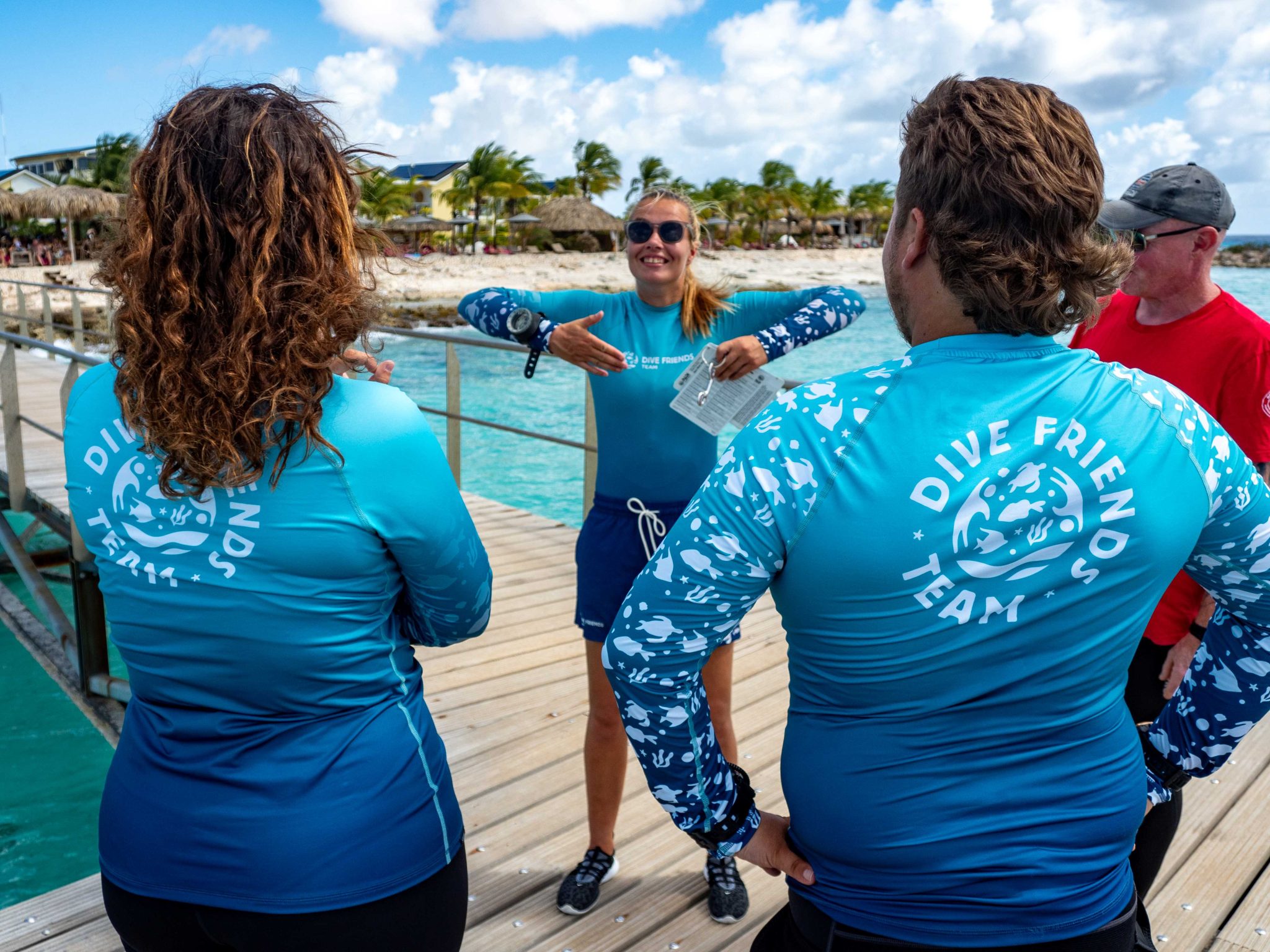
Dive Friends teaches the Instructor Development Course (IDC) several times a year to students who are eager to share their passion for diving with the world.
Dive Friends is known for the personal approach throughout the course. Their in-house course director will lead the students through every essential step, mentoring them to achieve their fullest potential as a dive instructor.
Applications for the following IDC start dates are now open:
- 12 April
- 5 July,
- 20 September
- 29 November
Partnership with Casita Palma
If the student opts for the IDC-Deluxe or IDC-Supreme package, their accommodation will be arranged for them at Casita Palma. This small and quiet resort is within walking distance from Dive Friends Bonaire’s main dive shop location and has everything you need to relax after an intense day of IDC training. Breakfast is included, so the student will always be fuelled and ready for their day.
Contact Dive Friends Bonaire’s Course Director Eddy for more information: coursedirector@divefriendsbonaire.com.
-

 News3 months ago
News3 months agoHone your underwater photography skills with Alphamarine Photography at Red Sea Diving Safari in March
-

 News2 months ago
News2 months agoCapturing Critters in Lembeh Underwater Photography Workshop 2024: Event Roundup
-

 Marine Life & Conservation Blogs2 months ago
Marine Life & Conservation Blogs2 months agoCreature Feature: Swell Sharks
-

 Blogs2 months ago
Blogs2 months agoMurex Resorts: Passport to Paradise!
-

 Blogs2 months ago
Blogs2 months agoDiver Discovering Whale Skeletons Beneath Ice Judged World’s Best Underwater Photograph
-

 Gear News3 months ago
Gear News3 months agoBare X-Mission Drysuit: Ideal for Both Technical and Recreational Divers
-

 Gear Reviews2 months ago
Gear Reviews2 months agoGear Review: Oceanic+ Dive Housing for iPhone
-

 Marine Life & Conservation2 months ago
Marine Life & Conservation2 months agoSave the Manatee Club launches brand new webcams at Silver Springs State Park, Florida











